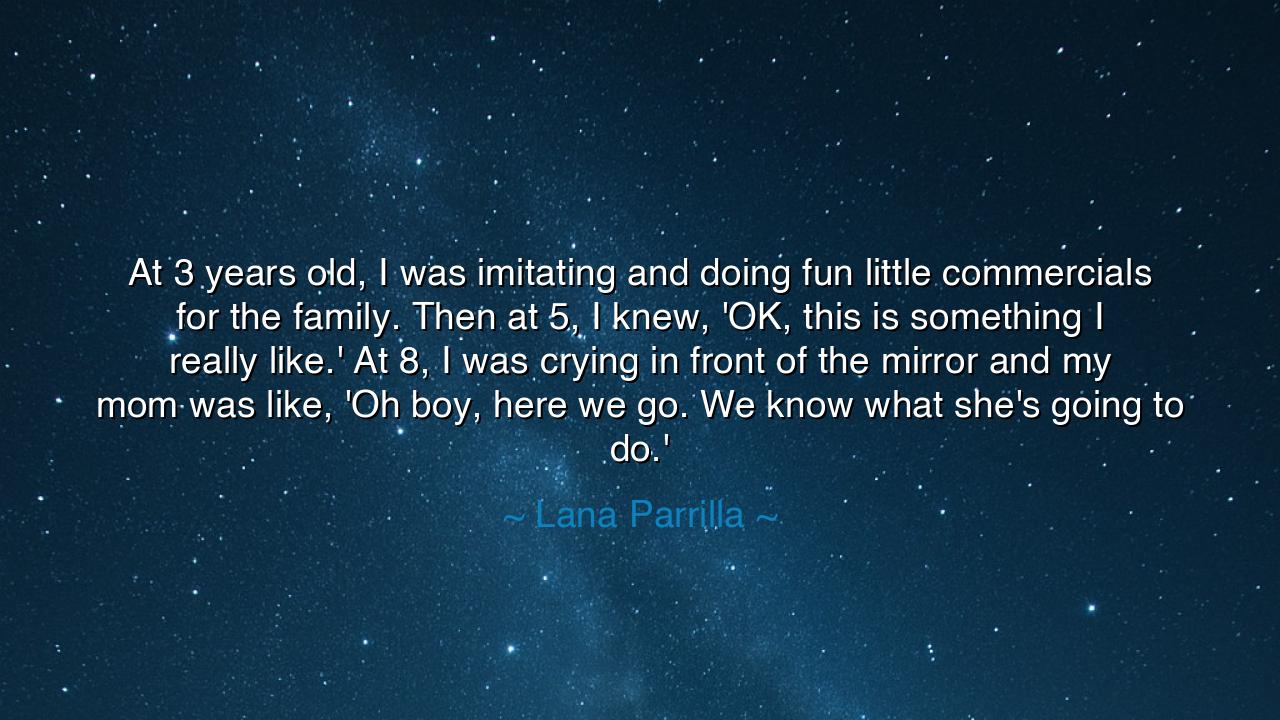
At 3 years old, I was imitating and doing fun little commercials
At 3 years old, I was imitating and doing fun little commercials for the family. Then at 5, I knew, 'OK, this is something I really like.' At 8, I was crying in front of the mirror and my mom was like, 'Oh boy, here we go. We know what she's going to do.'






Bob Mortimer once confessed with gentle candor: “House of Fools, that was the first thing I was sad that we couldn’t do any more.” This simple reflection carries a weight far greater than the words themselves. It is the sorrow of creation cut short, the ache that comes when joy must be set aside, and the recognition that even laughter itself, though bright as lightning, is fleeting. His lament is not just about a show, but about the nature of endings—about how beauty and absurdity, once woven, must one day unravel.
The House of Fools was more than a comedy; it was a sanctuary of imagination, a gathering place where absurdity became wisdom and foolishness became delight. For Mortimer, it was not merely a television program, but a house built from his own spirit, shared with others who brought it to life. To lose it was to lose a part of himself. The sadness he felt is the sadness of all creators who must watch something beloved fade into memory, not because it lacked value, but because time decreed it so.
From the ancient world, we see this same truth. The Greeks built grand theaters where actors played gods and mortals, stirring whole cities into tears and laughter. Yet many of these works are now lost, their stages silenced, their scripts gone to dust. Imagine the sorrow of a playwright whose words once echoed beneath the Acropolis, now vanished into history. Mortimer’s loss is part of this same eternal pattern: the grief of impermanence, the reality that even our finest creations are but guests in the house of time.
And yet, the very sadness Mortimer describes is proof of greatness. We do not mourn what is empty; we only mourn what mattered. That his heart ached when House of Fools ended shows the depth of his love for it, the richness of the joy it gave both to himself and to others. To grieve an ending is to honor what came before. In this way, sadness is not weakness but reverence, a sacred bow before the fleeting nature of joy.
The meaning of his reflection reaches beyond art. Each of us builds “houses of fools” in our lives—friendships, gatherings, moments of unrestrained laughter that cannot last forever. When they end, we feel the same sorrow. Yet we must remember: impermanence is not failure, it is the natural course of life. What matters is not that it ended, but that it was. That, for a time, we stood within the house of joy and lived fully.
The lesson is clear: embrace the things you love while they exist, and let their endings teach you gratitude rather than despair. If something you cherish fades, carry its spirit forward by creating anew. Just as Mortimer can no longer live in the House of Fools, he can build new houses of laughter, and so can we—new spaces of joy, new creations of the heart, new gatherings of the soul.
Practical wisdom calls us to act: cherish the present while it is with you. Do not wait until it is gone to recognize its worth. Create joy while you can, and when endings come, let them remind you to begin again. For in life, as in art, every ending is also the opening of space for something new to be born.
Thus, Bob Mortimer’s words are not only about a single show. They are a timeless teaching: that sadness is the shadow of joy, and endings are the price of beginnings. May we, too, learn to grieve what has passed, honor it with memory, and still rise to create new houses of laughter in the days ahead.






AAdministratorAdministrator
Welcome, honored guests. Please leave a comment, we will respond soon